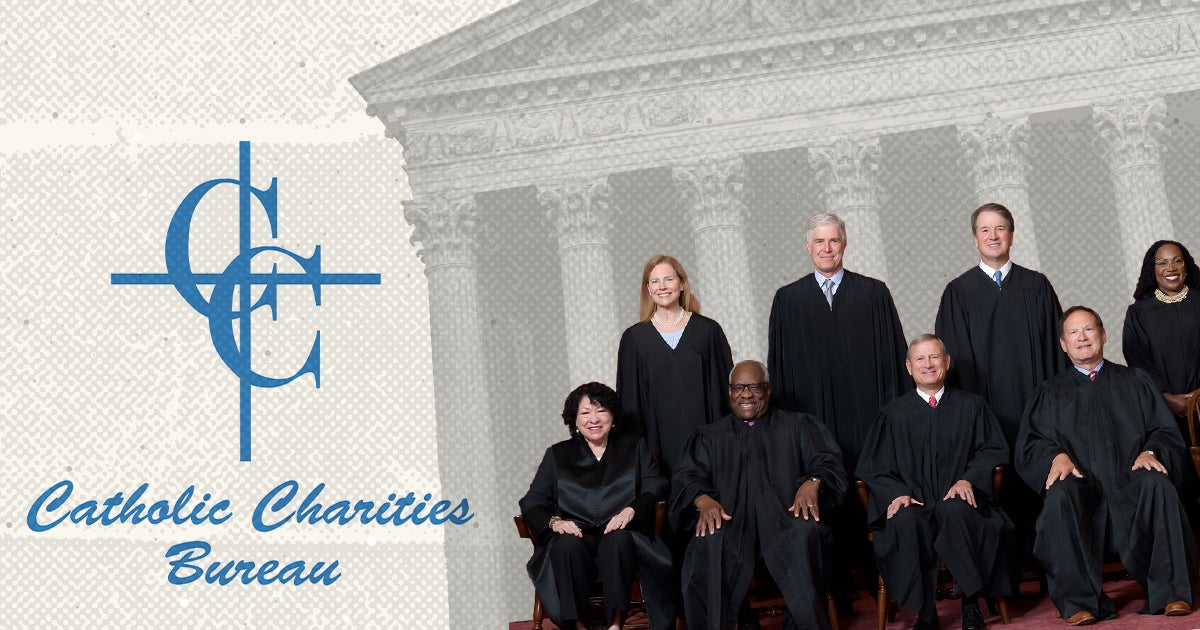
by Jorge Gomez • 3 minutes
On Thursday, the U.S. Supreme Court ruled in favor of Catholic Charities Bureau (CCB), a nonprofit ministry that was denied a tax exemption because, according to the state of Wisconsin, it wasn’t “operated primarily for religious purposes.”
In Catholic Charities Bureau Inc. v. Wisconsin Labor and Industry Review Commission, the Supreme Court unanimously ruled that the state violated the First Amendment protection for religion and discriminated against CCB. The nation’s highest court reversed a Wisconsin Supreme Court ruling that said CCB didn’t qualify as a religious organization because its ministries and outreach to the poor was not religious enough.
First Liberty filed a friend-of-the-court brief in support of CCB arguing that the U.S. Supreme Court should reverse the Wisconsin Supreme Court’s ruling. We explained that CCB is carrying out the mission of the Catholic Church to help those in need.
“Any attempt by the government to determine which religiously motivated actions are sufficiently religious enough to enjoy either constitutional protection or eligibility for a government benefit like tax exemption is ‘obnoxious to the Constitution,’” said First Liberty Senior Counsel Ryan Gardner.
“We applaud the Justices for again affirming unanimously that the First Amendment guarantees the right of all Americans to engage in religious exercise defined by the manner dictated by their sincere religious beliefs rather than the government’s preferences,” Gardner added.
“A law that differentiates between religions along theological lines is textbook denominational discrimination,” wrote Justice Sonia Sotomayor, who delivered the Court’s opinion. “Such laws establish a preference for certain religions based on the content of their religious doctrine, namely, how they worship, hold services, or initiate members and whether they engage in those practices at all. Such official differentiation on theological lines is fundamentally foreign to our constitutional order.”
“Church-related nonprofit employers care for the sick, feed the hungry, and improve the world in countless ways,” Justice Ketanji Brown Jackson wrote in a concurrence. “Most do this—no doubt—for religious reasons.”
A Big Win in the Ongoing Battle to Stop Government from Criminalizing Compassion
The Court’s decision sets an important precedent that protects longstanding tax exemptions for faith-based nonprofits. This will impact houses of worship, ministries and charitable organizations across the country that make an incredible, life-changing impact in the lives of millions of people.
This is a big victory for religious freedom, but the battle is far from over. Across America, cities and government officials are criminalizing compassion.
We have a powerful ruling in hand that will be positive as First Liberty continues to fight several major cases involving churches and ministries take care of the most vulnerable among us, including:
Motivated by their religious beliefs, Dad’s Place and The Rock both open their doors and use their property to help people who have nowhere else to go, offering them a safe place to stay. Similarly, Gethsemani Baptist has a food distribution ministry that feeds hundreds of families.
But instead of offering support, local officials are choosing to punish and target these ministries for carrying out their religious mission. In each of these cases, the government has argued that the ministries are not religious enough because serving people in need is not a religious act.
Government cannot deny benefits or single out religious organizations based on what it thinks is “religious enough.” It’s not up to the government to decide what is or isn’t religious enough, as the Supreme Court just reaffirmed in the Catholic Charities Bureau case.
Churches shouldn’t be threatened or fined for feeding the hungry and caring for the most vulnerable. Criminalizing compassion betrays everything that religious freedom in America is about. The Constitution and Supreme Court precedent are clear: government must treat faith-based groups and religious people the same as everyone else.
First Liberty needs your ongoing support to win these cases. Together, we can fight to make sure churches in America are able to minister to their communities and care for people in need.
Please give to First Liberty, today.